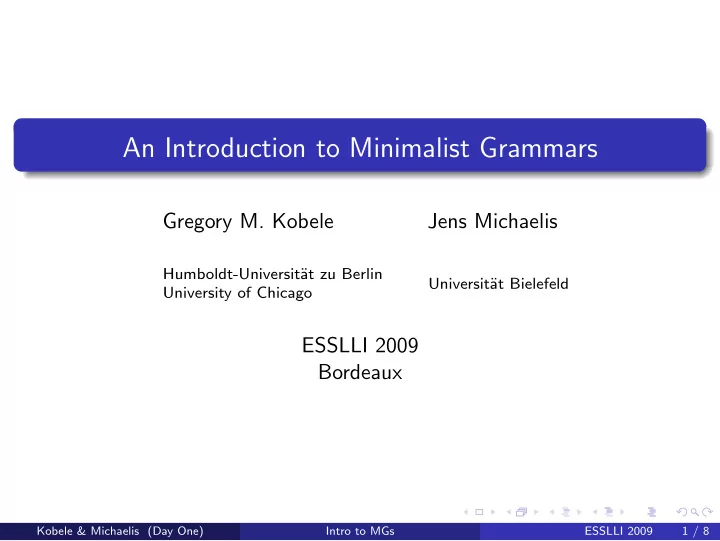

An Introduction to Minimalist Grammars Gregory M. Kobele Jens Michaelis Humboldt-Universit¨ at zu Berlin Universit¨ at Bielefeld University of Chicago ESSLLI 2009 Bordeaux Kobele & Michaelis (Day One) Intro to MGs ESSLLI 2009 1 / 8
Things of note: A course website exists here: http://wwwhomes.uni-bielefeld.de/jmichaelis/esslli2009 Jens and I are friendly people and welcome questions! Kobele & Michaelis (Day One) Intro to MGs ESSLLI 2009 2 / 8
What are Minimalist Grammars? Grammar formalism introduced by Stabler (1997) Proven mildly context-sensitive (Michaelis, 2001; Harkema, 2001) Formalize core properties of Minimalism (Chomsky, 1995) Kobele & Michaelis (Day One) Intro to MGs ESSLLI 2009 3 / 8
Why this class? A large number of linguists work in the minimalist tradition Minimalism tends toward a ‘decompositional’ style of analysis (familiar from generative semantics) Results in an interesting way of looking at many things Much work in minimalism is difficult for those not in the tradition to make sense of, much less critically evaluate MGs provide a way to do just this! Kobele & Michaelis (Day One) Intro to MGs ESSLLI 2009 4 / 8
What are they trying to do? Goals of Generative Linguistics How do we use language? How do we learn to use language? What is ‘use of language’? ability to understand (novel) utterances: Associate sounds with meanings ability to produce (novel) utterances: Associate meanings with sounds One question: Which sounds are associated with which meanings? Another: How does this association get computed in real-time? Kobele & Michaelis (Day One) Intro to MGs ESSLLI 2009 5 / 8
What are they trying to do? Goals of Generative Linguistics How do we use language? How do we learn to use language? What is ‘use of language’? ability to understand (novel) utterances: Associate sounds with meanings ability to produce (novel) utterances: Associate meanings with sounds One question: ⇒ Which sounds are associated with which meanings? ⇐ Another: How does this association get computed in real-time? Kobele & Michaelis (Day One) Intro to MGs ESSLLI 2009 5 / 8
Why a restrictive grammar formalism? Two questions about learning: Which are the learnable languages (sound-meaning associations)? 1 How does learning work in real-time? 2 A restrictive grammar formalism encodes the (empirical) hypothesis that some languages are not learnable. The idea is that these languages are not learnable because they can’t be represented in the terms the learner frames hypotheses. (Assuming: A hypothesis includes a statement of a grammar) Kobele & Michaelis (Day One) Intro to MGs ESSLLI 2009 6 / 8
What will we do? Mon Introduction to the formalism Tue Syntactic and Semantic Analysis: Passive, Raising, Expletive- it , and Quantifier Scope Wed Weak Generative Capacity (Apparently) Problematic Constructions Thu Extensions A Transductive Perspective Fri Guest lecture by Ed Stabler! Kobele & Michaelis (Day One) Intro to MGs ESSLLI 2009 7 / 8
Chomsky, N. (1995). The Minimalist Program . Cambridge, Massachusetts: MIT Press. Harkema, H. (2001). Parsing Minimalist Languages . Ph. D. thesis, University of California, Los Angeles. Michaelis, J. (2001). On Formal Properties of Minimalist Grammars . Ph. D. thesis, Universit¨ at Potsdam. Stabler, E. P. (1997). Derivational minimalism. In C. Retor´ e (Ed.), Logical Aspects of Computational Linguistics , Volume 1328 of Lecture Notes in Computer Science , pp. 68–95. Berlin: Springer-Verlag. Kobele & Michaelis (Day One) Intro to MGs ESSLLI 2009 8 / 8
Recommend
More recommend